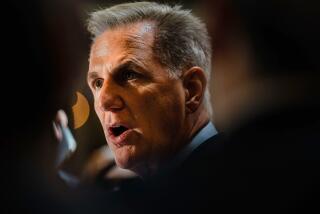New Talks Yield Nothing, but Deadline Date Extended : Baseball: Owners reject players’ taxation proposal and postpone announcement on canceling the season until next week.
- Share via
NEW YORK — Maybe nobody wanted to be the bad guy.
The deadline for canceling the rest of the baseball season came and went Friday, with still no decision.
Baseball owners rejected the players’ proposal for ending the month-old strike, but postponed until next week a call on whether to give up on one of the most memorable seasons ever.
Not that there’s much of it left, anyway. The season is scheduled to end three weeks from Sunday, and still the strike drags on.
Union chief Donald Fehr said restarting the games “becomes progressively harder with each passing day, but we’re not going to shut the doors until they shut them.”
Acting commissioner Bud Selig, who imposed the deadline last week, didn’t even mention it in his opening statement to reporters after a one-hour meeting between the sides. Then he was evasive about it during the question-and-answer period that followed.
“I said all week long that common sense should prevail,” he said. “We’ll have no announcement on the season until very early next week.”
Asked if Friday’s events caused him to change the deadline, Selig said: “I don’t think so really.”
Asked if owners would say it was too late to complete the season if a deal is reached, Selig said: “It depends when the deal is made.”
Some union officials and player agents had speculated that Selig’s deadline wasn’t firm.
If there isn’t a deal, Selig said his name would be on the announcement to cancel the World Series for the first time since 1904.
“I’ll take the responsibility. It will be mine,” he said.
In rejecting the union’s proposal, Selig said it didn’t address the owners’ desire for cost containment, which in management’s proposal took the form of a salary cap.
“We have to establish a common ground, and tragically we have failed to do so at every level to this point,” said Selig, who entered the talks for the first time Friday. “Nobody dreads these circumstances more than I do, or is more dismayed by them.”
Owners still insist on a salary cap and players say they’ll never agree to one.
“If they maintain the salary cap, this will go into the off-season, into next season and as long as there is a salary cap,” Texas Rangers pitcher Kevin Brown said.
No talks were scheduled during the weekend, though Fehr said he thought there would be contact between the sides.
Selig also said he thought there would be communication between the sides, “but if not, we will have an orderly announcement early next week.”
Players said at least part of their bargaining team will remain in New York, but owners said they were unsure if they would stay.
“Dick announced in the meeting we will be meeting again,” Fehr said. “None of us are quite sure why.”
The union’s proposal called for teams to split 25 percent of their gate receipts instead of the current 20 percent in the American League and 4 percent in the National League.
It called for the teams with the 16 highest payrolls to pay a 1 1/2 percent payroll “tax” and the 16 teams with the highest revenue to pay a 1 1/2 percent revenue “tax.” That money would be distributed to the other 12 clubs, but no club would be on the receiving end for more than two consecutive years.
Management negotiator Richard Ravitch said the union’s plan would redistribute only $50 million to small-market teams instead of the $75 million in the owners’ plan. He said owners wouldn’t agree to a deal that didn’t contain salaries.
“They’re still stuck on the same old stuff they’ve been stuck on seemingly for a generation,” Fehr said.
Standing grim-faced behind Selig during his news conference were Atlanta Braves president Stan Kasten, Colorado Rockies chairman Jerry McMorris, Braves chairman Bill Bartholomay and former St. Louis Cardinals CEO Stuart Meyer.
Chicago White Sox owner Jerry Reinsdorf, who had been involved in earlier discussions this week, was absent.
“It was clear that the salary cap is still their primary consideration,” Fehr said. “It does not appear at this point that anything we said was given serious consideration.”
Selig and Fehr continued to disagree about whether relevant information on the owners’ revenue-sharing plan had been withheld from the union. Selig also denied that some clubs hadn’t been provided the union’s proposal.
Los Angeles Dodgers pitcher Orel Hershiser, speaking on behalf of the players, said he believed most pitchers wouldn’t be able to throw for more than three-to-five innings in their first starts if the strike ends.
He also said he never would accept a deal with a salary cap.
“I’m prepared to sit out . . . . as long as it takes,” he said.
More to Read
Are you a true-blue fan?
Get our Dodgers Dugout newsletter for insights, news and much more.
You may occasionally receive promotional content from the Los Angeles Times.










